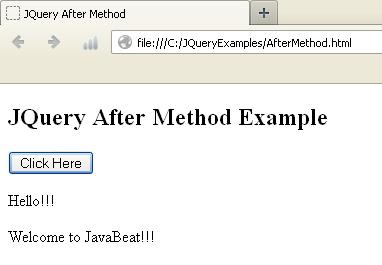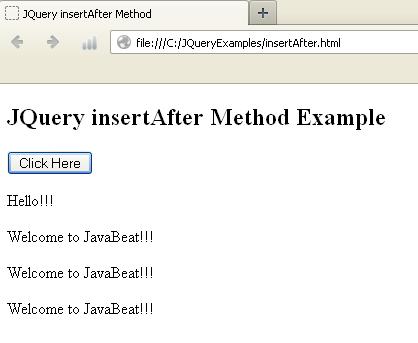After() Method
JQuery After method is used for inserting content after each element in the set of matched elements. In general, it is used to insert things after one or several elements. With after() method, the selector expression preceding the method is the container after which the content is inserted.
JQuery After() Syntax
$(selector).after(content)
It has parameter called content which is required parameter which specifies content to be inserted after selected elements.
JQuery After() Example
<!doctype html>
<head>
<title>JQuery After Method</title>
<script src="http://code.jquery.com/jquery-1.11.0.min.js"></script>
</head>
<h2>JQuery After Method Example</h2>
<script type="text/javascript">
$(document).ready(function(){
$("button").click(function(){
$("p").after("Welcome to JavaBeat!!!");
});
});
</script>
<body>
<button>Click Here</button>
<p>Hello!!!</p>
</body>
</html>
- As shown in the above program, we have used the code inside $(document).ready which is an event which fires up when document is ready. It will run once the page document object model is ready for JavaScript code to execute.
- $(“button”).click(function()) line defines click event which occurs when button is clicked.
- $(“p”).after(“Welcome to JavaBeat!!!”); line insert this content after the line Hello!!!.
When you run the above example, you would get the following output :

insertAfter() Method
It is used to insert content after specified set of elements. When using this method, the content precedes the method either as selector expression or as markup created on the fly and is inserted after the target container. It works slightly differently when the content being added is an existing element on the page.
JQuery insertAfter() Syntax
$(content).insertAfter(selector)
It has parameters called content which is required parameter which specifies content to be inserted after selected elements and selector which specifies where to inset the content.
JQuery insertAfter() Example
<!doctype html>
<head>
<title>JQuery insertAfter Method</title>
<script src="http://code.jquery.com/jquery-1.11.0.min.js"></script>
</head>
<h2>JQuery insertAfter Method Example</h2>
<script type="text/javascript">
$(document).ready(function(){
$("button").click(function(){
$("<p> Welcome to JavaBeat!!! </p>").insertAfter("p");
});
});
</script>
<body>
<button>Click Here</button>
<p>Hello!!!</p>
</body>
</html>
- As shown in the above program, we have used the code inside $(document).ready which is an event which fires up when document is ready. It will run once the page document object model is ready for JavaScript code to execute.
- $(“button”).click(function()) line defines click event which occurs when button is clicked.
- $(“Welcome to JavaBeat!!!”).insertAfter(“p”); line inserts Welcome to JavaBeat!!! line after Hello!!! line.
When you run the above example, you would get the following output :


 Spring Data Neo4j Tutorial
Spring Data Neo4j Tutorial